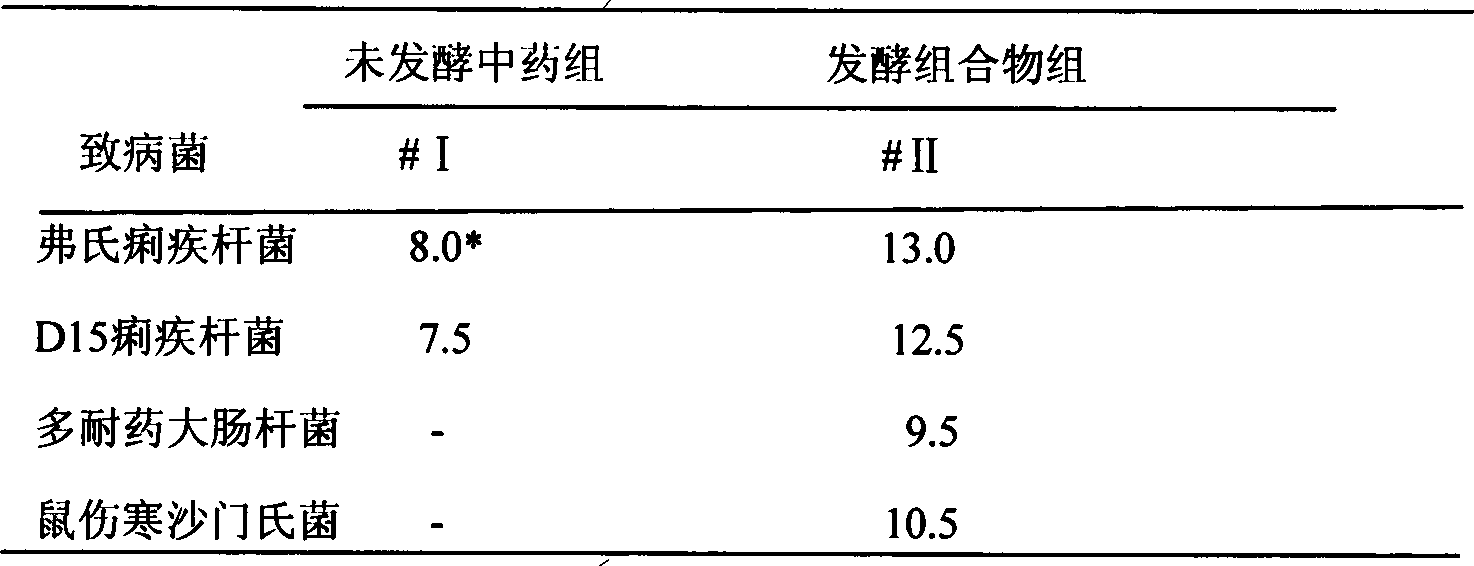Fermented composition for preventing and treating digestive system diseases
A technology for digestive system diseases and extracts, which is applied in the field of the influence of probiotics on the biological activity of traditional Chinese medicine extracts, and can solve problems such as the inability to detect quercetin metabolites
- Summary
- Abstract
- Description
- Claims
- Application Information
AI Technical Summary
Problems solved by technology
Method used
Image
Examples
Embodiment 1
[0021] Example 1: Preparation of fermented composition of traditional Chinese medicine compound for invigorating the spleen and stomach by probiotic fermentation
[0022] Weigh each Chinese medicine ingredient according to the following weights: 75g of malt, 50g of hawthorn, 50g of poria cocos, 25g of tangerine peel, 25g of jujube, 10g of licorice, 9g of ginger, and 41g of fresh radish. Extract juice from ginger and fresh radish, add 8 times the amount of water to soak the other six traditional Chinese medicines for 30 minutes, extract at 100°C for 1 hour, filter, add 6 times the amount of water to the filter residue, extract at 100°C for 1 hour, filter, and combine the filtrates , concentrated under reduced pressure to 2:1-4:1 (that is, every 2-4ml extract is equivalent to 1g medicinal material). Add ginger and fresh radish juice, and set the volume to 1000ml to obtain the compound Chinese medicine extract. Then add an appropriate amount of glucose (1.0%), peptone (0.4%), ye...
Embodiment 2
[0025] Example 2: small intestine propulsion experiment of fermented composition of the present invention and unfermented Chinese medicine compound extract
[0026] The purpose of this example is to demonstrate that the fermented composition prepared by the method of the present invention is better than the non-fermented Chinese medicine compound extract by using the small intestine propulsion experiment of mice.
[0027] The fermented composition prepared in Example 1 and the compound extract of traditional Chinese medicine without probiotic fermentation prepared in a similar manner were concentrated to the same concentration respectively as test samples.
[0028] Forty male mice weighing 18-22 g were randomly divided into 4 groups, 10 in each group, which were model control group, unfermented Chinese medicine compound extract group, fermented composition group, and blank control group. The test samples were given orally, and the control group was given water in the same way,...
Embodiment 3
[0035] Example 3: Effects of the fermented composition of the present invention and unfermented traditional Chinese medicine compound extract on rat body weight, food intake and digestive enzymes
[0036] The purpose of this example is to use the effects on rat body weight, food intake and digestive enzymes to illustrate that the fermented composition prepared by the method of the present invention is superior to the non-fermented traditional Chinese medicine compound extract.
[0037] The fermented composition prepared in Example 1 and the compound extract of traditional Chinese medicine without probiotic fermentation prepared in a similar manner were concentrated to the same concentration respectively as test samples.
[0038] Select 30 clean-grade male rats, weighing 140-150 g, and randomly divide them into 3 groups, 10 rats in each group, blank control group, non-fermented traditional Chinese medicine compound extract group, and fermented composition group. The test sample...
PUM
 Login to View More
Login to View More Abstract
Description
Claims
Application Information
 Login to View More
Login to View More - R&D
- Intellectual Property
- Life Sciences
- Materials
- Tech Scout
- Unparalleled Data Quality
- Higher Quality Content
- 60% Fewer Hallucinations
Browse by: Latest US Patents, China's latest patents, Technical Efficacy Thesaurus, Application Domain, Technology Topic, Popular Technical Reports.
© 2025 PatSnap. All rights reserved.Legal|Privacy policy|Modern Slavery Act Transparency Statement|Sitemap|About US| Contact US: help@patsnap.com



